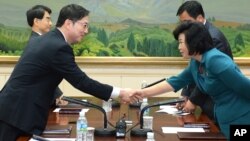SEOUL —
South Korea says the first high-level talks with the North in years will not occur as scheduled. A group of North Korean government officials had been expected to make a rare trip across the demilitarized zone to the South Korean capital on Wednesday.
The first talks in years between high-level officials of the two Koreas will not begin Wednesday.
Unification Ministry spokesman Kim Hyung-suk blamed Pyongyang for the talks not proceeding as scheduled.
Kim said the North disputed a vice minister heading the South's delegation and notified Seoul that the dispatch of its delegation to the South on Wednesday would be postponed.
The South had requested during working-level talks that ended early Monday at Panmunjom that the North send as its delegation leader, Kim Yang Gon, director of the United Front Department of the ruling Worker's Party. Not getting a positive response, Seoul then said its delegation would be headed by a vice minister instead of Unification minister Ryoo Kihl-jae.
Among the items on the agenda were how to re-start two shuttered inter-Korean ventures in the North: the Kaesong Industrial Zone and the Mt. Keumgang tourism resort.
Northeast Asia Deputy Project Director Dan Pinkston at the International Crisis Group said agreement to re-open the two joint projects could benefit Pyongyang in ways beyond just the hard currency it would again earn.
"Then I think they can manipulate that in ways to try to exploit relations with other countries, normalize relations, as they maintain their WMD programs and maintain their nuclear status. So I think this is what they will probably try to do. They have not changed their national security strategy, their nuclear ambitions. We see no change there. I think that's a great concern for many people in the world," he said.
A senior researcher at the state-funded Korea Institute for National Unification, Choi Jin-wook, views it as acceptable for the South to engage in dialogue with the North - even if the issue of North Korea's nuclear weapons development is not on the agenda.
"We can't move on to the next stage if North Korea does not abandon nuclear weapons. But we can still talk and we can try to do something even before that time. So I think this is only the beginning of opening the channels of direct communication with North Korea," said Choi.
Yonsei University Professor Lee Jung-hoon said if the talks proceed in the near future, they would be the start of a long trust-building process.
"I would remain very cautious and vigilant, and I am sure the Park Geun-hye government is doing precisely that. I don't think it is going to jump - it's not desperate. I think the desperate side is North Korea," said Lee.
The two Koreas have never established diplomatic relations. They fought each other to a stalemate after a three-year civil war in the early 1950's. The conflict, which devastated the Korean peninsula, ended with an armistice. No peace treaty has been signed.
Additional reporting by Youmi Kim in the VOA Seoul bureau.
The first talks in years between high-level officials of the two Koreas will not begin Wednesday.
Unification Ministry spokesman Kim Hyung-suk blamed Pyongyang for the talks not proceeding as scheduled.
Kim said the North disputed a vice minister heading the South's delegation and notified Seoul that the dispatch of its delegation to the South on Wednesday would be postponed.
The South had requested during working-level talks that ended early Monday at Panmunjom that the North send as its delegation leader, Kim Yang Gon, director of the United Front Department of the ruling Worker's Party. Not getting a positive response, Seoul then said its delegation would be headed by a vice minister instead of Unification minister Ryoo Kihl-jae.
Among the items on the agenda were how to re-start two shuttered inter-Korean ventures in the North: the Kaesong Industrial Zone and the Mt. Keumgang tourism resort.
Northeast Asia Deputy Project Director Dan Pinkston at the International Crisis Group said agreement to re-open the two joint projects could benefit Pyongyang in ways beyond just the hard currency it would again earn.
"Then I think they can manipulate that in ways to try to exploit relations with other countries, normalize relations, as they maintain their WMD programs and maintain their nuclear status. So I think this is what they will probably try to do. They have not changed their national security strategy, their nuclear ambitions. We see no change there. I think that's a great concern for many people in the world," he said.
A senior researcher at the state-funded Korea Institute for National Unification, Choi Jin-wook, views it as acceptable for the South to engage in dialogue with the North - even if the issue of North Korea's nuclear weapons development is not on the agenda.
"We can't move on to the next stage if North Korea does not abandon nuclear weapons. But we can still talk and we can try to do something even before that time. So I think this is only the beginning of opening the channels of direct communication with North Korea," said Choi.
Yonsei University Professor Lee Jung-hoon said if the talks proceed in the near future, they would be the start of a long trust-building process.
"I would remain very cautious and vigilant, and I am sure the Park Geun-hye government is doing precisely that. I don't think it is going to jump - it's not desperate. I think the desperate side is North Korea," said Lee.
The two Koreas have never established diplomatic relations. They fought each other to a stalemate after a three-year civil war in the early 1950's. The conflict, which devastated the Korean peninsula, ended with an armistice. No peace treaty has been signed.
Additional reporting by Youmi Kim in the VOA Seoul bureau.





